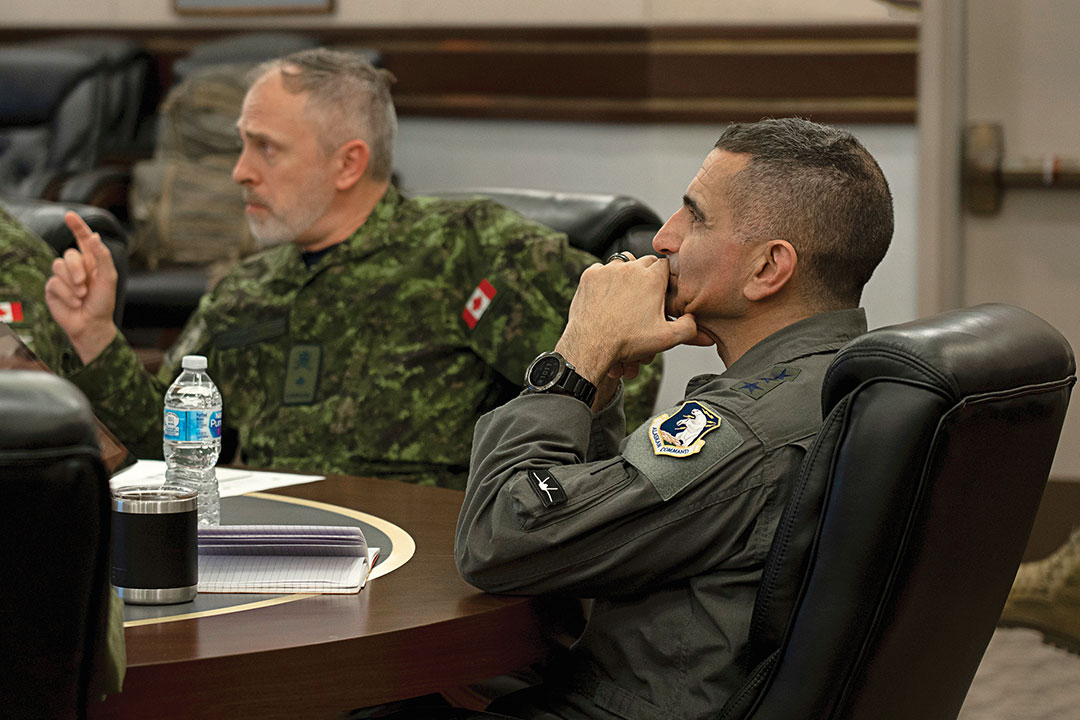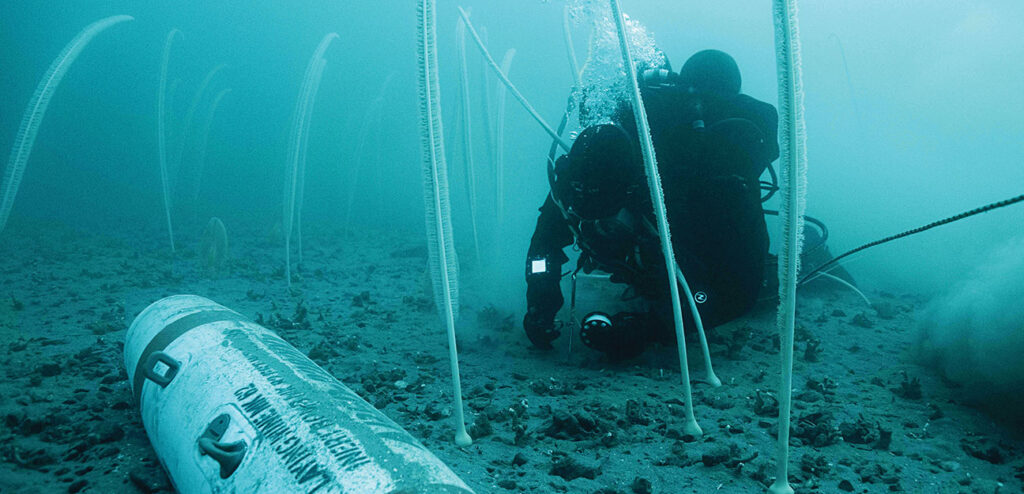A Royal Canadian Navy diver performs mine countermeasure operations as part of the biennial Exercise Arctic Edge in March 2022 near Juneau, Alaska. CPL. HUGO MONTPETIT/CANADIAN ARMED FORCES
BRIG. GEN. PASCAL GODBOUT/COMMANDER JOINT TASK FORCE NORTH
Canada’s Arctic is immense, making up more than 40% of the country’s landmass and 75% of its coastline. Sparsely populated, with limited infrastructure and challenging weather, this beautiful yet austere region is of great strategic importance. The impact of climate change, increased activity and an evolving geopolitical environment has heightened interest in this area. Joint Task Force North (JTFN) is the Canadian Armed Forces (CAF) headquarters responsible for the three territories that form the majority of the Canadian Arctic.
While the threat of an overt military incursion is assessed as low, Canadian sovereignty may be challenged through below-threshold activities. Increased interest and activity in the Arctic have resulted in nontraditional threats that include heightened risks of undeclared activities by foreign actors, transnational criminal activities, environmental disasters, and disinformation and cyberattacks. Other threats in the Canadian Arctic include the increasing frequency and severity of natural disasters, as well as aging critical infrastructure and risks of catastrophic failure.
Canada must be prepared to defend against threats through, to and in the Canadian Arctic. The defense of North America begins with the North American Aerospace Defense Command (NORAD), the binational command of the United States and Canada responsible for aerospace warning, aerospace control and maritime warning. This long-standing agreement enables JTFN to zero in on our area of operations and concurrently support national strategic objectives.

U.S. Northern Command (USNORTHCOM), NORAD and the Danish Joint Arctic Command (JACO) are key partners in ensuring Arctic safety and security across our adjoining and interconnected areas of operations. This ongoing and deepening collaboration forms a strong multidomain capacity in the Arctic, enhancing our all-domain situational awareness and ensuring our collective readiness to respond to threats.
We work closely with allies, federal, territorial and Indigenous government partners as well as academia and the private sector to enhance awareness and security in the North. In many instances, the CAF may not be the lead agency to respond to security threats to or in the Arctic. However, we may be part of a whole-of-government coordinated response or be requested to assist territorial governments. Mitigating the risks associated with these threats requires close coordination and intimate knowledge of the terrain, both human and physical. Many of these threats span borders, and Canada has robust agreements in place with our neighbors who augment our role in the defense of North America. These include the Canada-U.S. Civil Assistance Plan, the Combined Defense Plan among Canadian Joint Operations Command, NORAD and USNORTHCOM, as well as a memorandum of understanding on Arctic Defense, Security and Operational Cooperation between the CAF chief of the defense staff and the chief of defense of Denmark.
JTFN also contributes by participating in key information-sharing forums such as the Arctic Security Forces Roundtable that includes Canada, Denmark, Finland, France, Germany, Iceland, Netherlands, Norway, Sweden, United Kingdom and U.S. JTFN co-chairs two northern partner forums: the Northern Interdepartmental Intelligence Working Group and the Arctic Security Working Group. The latter includes representation from federal departments, territorial governments, Indigenous governments, allied forces, northern communities and academia. While these working groups focus primarily on Canadian Arctic security concerns, the participation of Alaskan Command, U.S. law enforcement agencies and JACO ensure shared awareness of broader issues given our shared borders.

JTFN plans and executes Operation Nanook, the CAF’s signature operation focused on increasing our ability to operate in a challenging environment and respond to safety or security issues specific to the North. This annual series of operations ensures CAF presence, surveillance and control across the North throughout the year. In addition to our domestic partners, previous Nanook operations have included participation from nations including Belgium, Denmark, Finland, France, Norway, Sweden, the U.K. and the U.S. This enables us to validate current and new Arctic capabilities, ensure interoperability and share best practices to operate in the toughest conditions, thus enhancing our readiness.
Other key operations involving JTFN include Operation Limpid, focused on keeping a routine watch over Canada’s air, maritime, land and aerospace domains through space-based sensors, radars, Automated Information System transponders, air surveillance, naval patrols, operational activities, and the Canadian Rangers, a subcomponent of the Canadian Armed Forces Reserve who provide a limited military presence in Canada’s sparsely populated northern, coastal and isolated areas. JTFN also has the capacity to coordinate contingency operations across the Territories, such as Operation Lentus, the CAF’s response to requests from provincial and territorial governments for support in responding to natural and human-caused disasters in Canada. Finally, upon request, JTFN activates the Canadian Rangers for ground search and rescue when community and territorial efforts require support.
In addition to NORAD and JTFN operations, Canada regularly participates in international exercises in the Arctic with our allies. Recent participation includes U.S.-led activities such as ICEX, Exercise Arctic Edge, Joint Pacific Multinational Readiness Center and Exercise Arctic Eagle-Patriot.
The coordination and close collaboration among JTFN, NORAD, USNORTHCOM and JACO continues to ensure regional security and continental defense capabilities, reinforces the NATO alliance and ensures Canada does its part to secure and defend NATO’s western flank.

